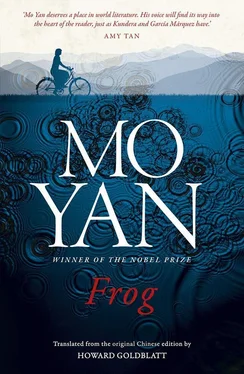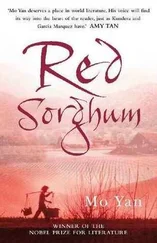The meeting site was a sea of people, all gathered in front of an impressive stage made of wood and reed mats. At the time, the commune boasted a group of skilled workers who specialised in building stages and bulletin board kiosks. Dozens of horizontal red flags adorned the stage along with red banners with white lettering. When we arrived, four loudspeakers mounted on a pair of corner posts were blaring ‘A Song of Quotations’: Marxist thought has thousands of threads that come together in a single remark: To rebel is justified! To rebel is justified!
The place was in an uproar. I attempted to muscle my way up front, my eye on a spot at the foot of the stage. People I shouldered out of the way responded churlishly with feet and fists and elbows. But after all that hard work — my clothes were soaked and my body was black and blue — I not only didn’t make it to the front, I was actually manhandled to the edge of the crowd, where I heard the sound of cracking ice, and had a bad feeling in my bones. Just then a man whose voice sounded like a duck’s quack, burst from the loudspeakers: The public denouncement session is about to begin. All you poor and lower-middle-class peasants, please quiet down… in the front rows, please sit down, sit down…
I made my way over to the three storage sheds for gate boards on the western edge of the sluice gate. By wedging my toes in the spaces between bricks and grabbing hold of the eaves, I pulled myself up until I made it onto one of the roofs, all the way to the central ridge, from where I could see throngs of people and more red flags than I could count. I was nearly blinded by sunlight off of the river ice. Dozens of people were hunched over just west of the stage, all with their heads lowered. I knew who they were: the commune’s evil ox-ghosts and snake-demons waiting to be hauled up on the stage to be hounded by the masses. Xiao Shangchun was bellowing into a microphone. The one-time down-on-his-luck granary watchman could never have dreamed that such a position would one day be his. But at the beginning of the Cultural Revolution, as rebel leader, he had created a title for himself: Windstorm Rebel Corps Commander.
He was wearing an old army uniform turned white from too many launderings and made whole with dark patches; a red armband circled his bicep. His hair was so thin the scalp glistened in the sunlight. He affected the speech of big-shot characters we’d all seen in movies: drawing out his words, one hand on his hip, the other making all sorts of gestures. The loudspeakers made his voice loud enough to burst eardrums, overlaying the sound of waves crashing onto a rocky shore created by the masses, and caused by disturbances here one minute, there the next. I began to worry about the safety of my mother and other oldsters who were there. I tried to spot them in the crowd, but the glare from the ice was too bright. Bitter winds cut through my tattered coat and chilled me to the bone.
Xiao Shangchun waved his hand, and a dozen hulking men with clubs and sporting Security bands around their arms came out from behind the stage. They jumped down and began to quiet the boisterous crowd with clubs that had red cloths tied to the ends, making them look like torches. One young fellow, who was hit over the head, angrily tried to take the club away, and received a nasty poke in the ribs for his effort. Wherever these ruthless crowd controllers wielded their clubs, the people meekly made way, as Xiao Shangchun’s shrill voice sliced through the loudspeakers: Sit down, everyone! Sit down! Drag out the troublemakers.
The young man targeted by one security enforcer was yanked out of the crowd by his hair… the masses finally quieted down, some on their haunches, others seated, but no one on their feet. Like scarecrows in the field, the enforcers stood evenly spaced amid the crowd of people.
Bring the ox-ghosts and snake-demons up on the stage! Xiao Shangchun commanded. The miscreants’ feet never touched the ground as they were bundled up onto the stage.
I saw Gugu among them.
She did not go meekly. Every time one of the men pushed her head down, she defiantly raised it as soon as the hand was taken away. Her defiance only increased the pressure the next time, and in the end she was knocked to her knees; one of the security men put his foot on her back. Some members of the crowd hopped up onto the stage to shout slogans, but they evoked no echoing response from the people below. Finding their shouts ineffective, the sloganeers slipped back down into the crowd. Just then, a piercing wail exploded from somewhere in their midst. It was my mother’s howl of anguish: My poor suffering sister… have you horrid beasts no conscience at all…
Xiao Shangchun ordered his men to take all the other ox-ghosts and snake-demons off the stage and leave Gugu alone up there. The enforcer kept his foot on her back and struck a valiant pose. This was a demonstration of the popular slogan: Knock the class enemies to their knees and step on them when they’re down. When I saw that Gugu wasn’t moving, I worried she might be dead. My mother’s howls had faded away, and I thought she might be dead too.
The remaining ox-ghosts and snake-demons were herded over to a large poplar tree, where they were guarded by a security team armed with rifles. The detainees sat on the ground, heads lowered, unmoving as clay statues. Huang Qiuya’s head was resting against a brick wall, half of it shaved to make her not only ugly, but terrifyingly so. I’d been told that during the early days of the movement, Gugu had been one of the founders of the Norman Bethune Combat Brigade in the local health system. Like a fanatic, she’d shown no kindness to the director who had once been her protector, and she had treated Huang Qiuya with unprecedented cruelty. I knew this had been a survival measure, like a night traveller whistling past a graveyard out of fear. The old director, a decent man who’d found the bullying and humiliation intolerable, had killed himself by jumping down a well. Huang Qiuya, on the other hand, had responded to the imprecations of her antagonist by producing evidence of Gugu’s concealed relationship with the turncoat Wang Xiaoti, revealing that she had often cried out his name in her sleep at night, and divulging that when she came off duty one night, she discovered that her colleague, Wan Xin, was not in the dormitory; she wondered where an unmarried young woman could be that late. As she was weighing the possibilities, she saw three red signal flares soar up out of a grove of willow trees on the bank of the Jiao River and heard the roar of an aeroplane engine high overhead. Not long after that, a figure slinked back into the dormitory, and she recognised who it was — Wan Xin. Huang said she reported the incident to the director, but the capitalist roader was in cahoots with Wan Xin and suppressed her report. There was no doubt, she said, that Wan Xin was a secret agent for the Kuomintang, and this incident was serious enough to cost her her life. But she wasn’t finished. She also said that Gugu had engaged in trysts with the capitalist roader Yang Lin in the county seat, resulting in a pregnancy that Huang herself had aborted. The masses were a repository of rich creativity, but also a repository of evil imagination. Huang Qiuya’s revelation of Gugu’s two major crimes easily satisfied the people’s emotional needs; Gugu’s refusal to admit to any of it and her steadfast defiance further guaranteed fireworks at every denouncement session, and constituted a monstrous episode in the history of Northeast Township.
I gazed down from my rooftop perch at Huang Qiuya’s weird half-bald head and my loathing was tempered by sympathy, confusion, fear and grief. I picked up a shard of tile and took aim at that head. I could have hit it with ease. But I hesitated, and in the end did not throw it. Years later I told Gugu what I’d thought of doing. I’m glad you didn’t, she said. That would have made things even worse for me. In her later years Gugu believed she’d been guilty of terrible, unforgiveable things. I thought she was being too hard on herself, convinced that she was no worse than anyone who lived during those times. You don’t understand… The note of sorrow in her voice was palpable.
Читать дальше












